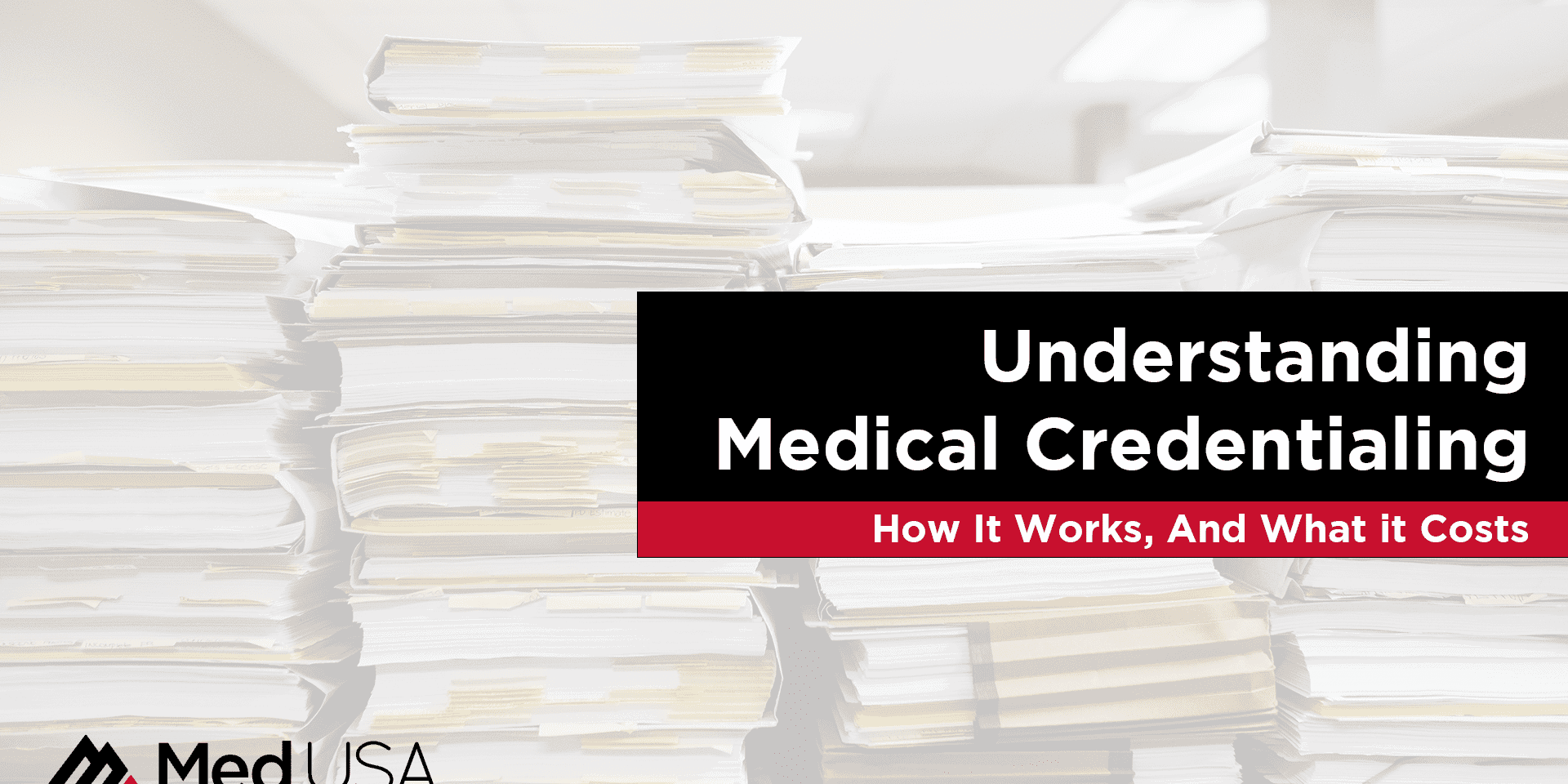
Medical Credentialing: How it Works and What it Costs
Credentialing is a term for a process that consists of two parts, credentialing and privileging. Credentialing is the verification of competency, as demonstrated by education, training, licensing and work experience. Privileging is the granting of approval for a healthcare provider to perform certain procedures based on the demonstration of competency.
How Medical Credentialing Works
Medical credentialing is a market-driven process that seeks to maintain standards of quality in the medical community for the benefit of patients. The process involves direct contact with primary sources for the verification of a healthcare provider’s qualifications. The credentialing authority (called a Credentials Verification Organization or CVO) will contact the university where the provider received their degree in medicine, had their training, and did their residency, to confirm their credentials.
They will also contact certification boards and licensing agencies to verify licenses and specialty certificates. Hospitals and other employers can provide confirmation of work history. Credentialing is important for all new hires, but it is performed at regular intervals even after hiring to conform to the standards of regulatory and accrediting organizations, like The Joint Commission (TJC), The Centers for Medicare and Medicaid Services (CMS), and the National Committee for Quality Assurance (NCQA).
What Are the Advantages of Medical Credentialing?
Medical credentialing provides quality assurance to the medical industry, which benefits all parties involved. Hospitals and clinics can be confident that the staff they hire will provide care at the standards demanded of them. Insurance companies have an incentive to keep their costs down and therefore prefer to ensure only those professionals who demonstrate sufficient competence to practice medicine.
Practitioners benefit from medical credentialing because once they receive privileges to accept clients from insurance companies, they can expand the number of patients who have access to them. Finally, patients get perhaps the greatest benefit of all, the knowledge that the medical industry is maintaining rigorous standards to ensure that the health care that patients receive is of the highest quality.
The advantages of medical credentialing are that it maintains confidence in the quality of the medical professions, minimizes medical errors and keeps costs down. This system makes sure that everyone is better off.
Who Needs to Receive Their Medical Credentials?
Medical credentials are required for a variety of healthcare providers, including:
- Physicians
- Podiatrists
- Ophthalmologists
- Optometrists
The credentialing system is thorough and comprehensive. It covers all aspects of healthcare and related services so that standards remain high.
Can a Provider Work During the Credentialing Process?
No. A healthcare provider must wait until the credentialing process is complete and approved before they can begin to work. This assures that every patient, at all times, receives care from professionals who have the proper education, training and experience to diagnose and treat their healthcare concerns. By allowing non-credentialed individuals to work, even if they are in the process of getting their credentials, a facility is putting itself at legal risk, as well as in jeopardy of losing its own credentials as an institution.
Medical students, residents and fellows do not require credentialing as long as their work does not go outside the scope of their training program. They are under the guidance and vigilance of credentialed professionals, however. They have not yet completed their training and so are not eligible for credentialing and privileging, so an exception is made to allow them to get the experience which will later allow them to receive their credentials and privileges.
What Kinds of Facilities Need Credentialing?
It is not only practitioners, but facilities themselves that need to maintain standards of care and competence. The following kinds of facilities and services are obliged to acquire and maintain the proper credentials to act as healthcare providers include:
- Ambulances
- Dialysis
- Durable Medical Equipment
- Home Health Services
- Hospice Care
- In-Home Care Services
- Independent Diagnostic Testing
- IV Home Infusion Therapy
- Laboratories and Laboratory Collection Sites
- Lithotripsy
- Prosthetics/Orthotics
- Radiology/Diagnostic Imaging
- Urgent Care Centers
By credentialing facilities as well as practitioners, the system adds an extra layer of protection for patients.
What Is the NCQA?
The National Commission for Quality Assurance is an independent, nonprofit organization. They evaluate and report on the quality of healthcare organizations and issue credentials for them. These organizations include preferred provider organization, managed behavioral healthcare organizations, new health plans, doctor organizations, managed care plans, credentials verification organizations, disease management programs and many others.
What Is TJC?
The Joint Commission is an accrediting organization that helps to maintain high standards of healthcare in the United States. Hospitals voluntarily submit to accrediting surveys of TJC every three years. These surveys are comprehensive evaluations of the standards of healthcare provided by the hospitals.
What Is CMS?
The Centers for Medicare and Medicaid Services is a federal agency within the United States Department of Health and Human Services. Formerly known as the Health Care Financing Administration (HCFA), it has a number of responsibilities, including overseeing quality standards in long-term care facilities and clinical laboratories. In addition, it works with state governments to administer Medicaid, the Children’s Health Insurance Program (CHIP) and to maintain health insurance portability standards. It also oversees HealthCare.gov.
What Is Primary Source Verification?
Primary source verification means that a CVO will verify credentials directly with the source of those credentials. In order to prevent any sort of fraud in the credentialing process, no documents from the applicant nor from any other third-party source are considered acceptable. A CVO will contact The Board of Medicine directly to confirm a medical license. Strict adherence to this standard is essential to maintaining certification for healthcare facilities, as well as simple common-sense best practice.
How Do I Get My Credentials?
The process can vary in detail depending on the facility where you apply, and the specialty in which you work. The basic process, however, is broadly similar across all fields and facilities.
The facility where you plan to work may have a credentialing service that they use. You can contact the provider representative in the appropriate department and request an application. Depending on the CVO, you may receive the application and all other documents by mail, fax or email. Once you complete your application, review the application checklist and then submit the application.
The CVO staff will begin the process of direct verification of credentials from the source. They will prepare a file for review by the credentialing committee. When they have finished, they will pass the file on to the credentialing committee at the facility in question. The credentialing committee will make the ultimate decision as to whether to approve or deny the application. Typically, they will send a letter with the decision to the applicant.
What Is a Credentialing Committee?
A credentialing committee maintains the integrity of the process by overseeing the application review and ensuring that all parties meet the necessary standards. A committee typically consists of doctors of varying specialties for medical review, a chairperson and a liaison with the CVO. Others may also serve on the committee.
In some cases, you may appeal the committee’s decision. This is not the case if you do not meet basic criteria to be credentialed. If you have the right of appeal, you will receive information on how to go about that process should the need arise.
How Long Does the Medical Credentialing Process Take?
The process can take anywhere from several days to several weeks. It can vary depending on what field you seek credentials in, what CVO you are using and whether you have provided all supporting documents and filled out the application correctly. For this reason, it is normally best to begin the application process 90 days before your start date at a new facility. Ninety days allows for some margin in case verification entities do not promptly respond to requests or if the CVO must investigate discrepancies for clarification.
The credentialing process consists of verification and evaluation, followed by review and approval. The CVO has very little control over the response time from outside sources who need to verify information. If they do not initially respond, the CVO will make further requests, which can cause significant delays.
You can help speed the process along by making sure that your application is correctly and thoroughly filled out, and by providing all needed supporting documentation. You can also contact your verification sources and request that they mail, fax or email all verification requests as soon as possible. Also, if you still have licenses pending, this can seriously delay the process. It is best to wait until your licenses are approved before you apply for credentials and privileges.
Can I Follow the Process as It Proceeds?
If the credentialing service is cloud-based, it will generally be easier to follow the process as it goes. There are often apps which allow providers to monitor the progress with updates and alerts. Often, they can get an email with a link to their specific application. They will need a username and password to set it up. If the applicant has a representative at their chosen institution, they can give permission for the representative to check up on the progress of the credential verification.
Some CVOs use only electronic documents while others use paper or a combination of the two. This can affect the transparency of the process, but paper forms can be scanned and uploaded to the cloud so they can be available for the applicant or his or her representative. The provider representative can help with any questions or concerns during the process.
What About Privileges?
The CVO will collect the necessary information for privileging during the application process, and the credentialing committee will make a determination based on this. Typically, a provider will have to fill out a form to apply for privileges, which come in two varieties.
Primary privileges are routine privileges that medical professionals share based on what they learned in their residency programs for their particular specialty. Specialty privileges are non-routine privileges that require more training. A CVO will require additional documents in order to evaluate the propriety of specialty privileges.
Physicians within each specialty participate in the development of privilege forms and determining privilege qualifications.
How Much Does Medical Credentialing Cost?
Medical credentialing costs vary from specialty to specialty, from facility to facility, and from CVO to CVO. Typically, an application fee of two or three hundred dollars is not out of the ordinary. Often, facilities will offer reimbursements or partial reimbursements upon successful completion of credentialing.
After the initial credentialing, periodic re-credentialing will be necessary, and CVOs usually provide this at a discounted rate.
Will I Have to Update My Credentials?
Hospitals and clinics will periodically re-evaluate a provider’s credentials, usually every 1 to 3 years. This helps maintain a high level of competence among healthcare staff if a provider neglects to fulfill this requirement, their privileges will expire and they will no longer be able to see patients at the facility. For reinstatement, they must complete the application process once more.
Choosing a credentialing service may depend on what hospital or clinic you are applying to. If you represent a healthcare facility, or if you are a provider with the option to choose, the usual standards apply here as anywhere else. Look for experience and a good reputation. Some services are on the cutting edge of the industry, while others lag behind.
If you are interested in using our credentialing services or want to find out more, contact us at (801) 352-9500 today.
Need Help With Credentialing Your Practitioners?


